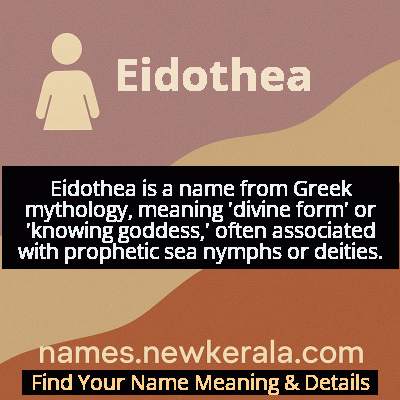Eidothea Name Meaning & Details
Origin, Popularity, Numerology Analysis & Name Meaning of Eidothea
Discover the origin, meaning, and cultural significance of the name EIDOTHEA. Delve into its historical roots and explore the lasting impact it has had on communities and traditions.
Name
Eidothea
Gender
Female
Origin
Greek
Lucky Number
4
Meaning of the Name - Eidothea
Eidothea is a name from Greek mythology, meaning 'divine form' or 'knowing goddess,' often associated with prophetic sea nymphs or deities.
Eidothea - Complete Numerology Analysis
Your Numerology Number
Based on Pythagorean Numerology System
Ruling Planet
Uranus (Rahu)
Positive Nature
Strong sense of order, loyal, practical, and disciplined.
Negative Traits
Stubborn, overly serious, rigid, and prone to feeling restricted.
Lucky Colours
Blue, gray.
Lucky Days
Saturday.
Lucky Stones
Blue sapphire.
Harmony Numbers
1, 7, 8.
Best Suited Professions
Managers, engineers, accountants, organizers.
What People Like About You
Dependability, discipline, practicality.
Famous People Named Eidothea
Eidothea (Mythological)
Sea Nymph/Divine Being
Helped Menelaus capture her father Proteus to learn how to return home from Troy
Eidothea hardeniana
Botanical Namesake
Rare rainforest tree species named after the mythological figure
Eidothea zoexylocarya
Botanical Namesake
Another endangered plant species carrying the mythological name
Name Variations & International Equivalents
Click on blue names to explore their detailed meanings. Gray names with will be available soon.
Cultural & Historical Significance
Historically, Eidothea represents the Greek understanding of the sea as both a physical and metaphorical realm—a place of danger, transformation, and hidden wisdom. Her mythological narrative demonstrates how the ancient Greeks conceptualized the acquisition of knowledge through struggle and respect for divine forces. The story of Eidothea helping Menelaus also illustrates the Greek belief that even heroes require divine assistance and that such help must be properly sought through ritual and respect. This mythological framework influenced later Western concepts of mentorship, guidance, and the transmission of esoteric knowledge.
Extended Personality Analysis
The name Eidothea evokes personality traits of profound wisdom, intuitive understanding, and compassionate guidance. Individuals with this name are often perceived as having deep emotional intelligence and the ability to see beneath surface appearances to understand core truths. Like the mythological sea nymph who revealed secrets to help others, modern Eidotheas tend to be natural counselors and advisors, possessing both the patience to observe and the wisdom to intervene at precisely the right moment. Their connection to water symbolism suggests emotional depth, adaptability, and the capacity to navigate complex interpersonal dynamics with grace.
These individuals typically exhibit strong analytical abilities combined with emotional sensitivity, making them excellent at solving problems that require both logical thinking and human understanding. They often serve as the 'wise advisor' in their social and professional circles, valued for their insight and discretion. The mythological association also suggests a certain mysterious quality—an ability to understand things that others miss and to guide people through transformations and difficult transitions. Their strength lies in their combination of deep knowledge and practical application, much like their namesake who didn't just possess secrets but knew how to help others use them effectively.
Modern Usage & Popularity
In contemporary naming practices, Eidothea remains an extraordinarily rare choice, typically selected by parents with specific interests in classical mythology, academic backgrounds in classics, or those seeking truly unique names with profound historical roots. The name has never appeared on mainstream baby name charts in English-speaking countries, maintaining its status as an exclusive and scholarly choice. However, it has seen occasional use in Greece and among diaspora communities, where mythological names enjoy more consistent popularity. Recent trends toward unique mythological names have brought increased attention to lesser-known figures like Eidothea, though its complexity and strong classical associations continue to limit widespread adoption. The name's modern usage often involves practical adaptations, with nicknames like 'Thea' or 'Eidy' making it more accessible for daily use while preserving its elegant full form for formal contexts.
Symbolic & Spiritual Meanings
Eidothea carries rich symbolic meanings rooted in her mythological role as a revealer of truths and guide through transformations. Symbolically, she represents the flow of hidden knowledge into conscious understanding—the process by which intuitive insights and subconscious wisdom become practical guidance. Her connection to the sea symbolizes the depth of the unconscious mind and the fluid nature of truth and identity. As the daughter of Proteus, the shape-shifter, she also symbolizes the ability to navigate constant change while maintaining core integrity. The mythological narrative of helping Menelaus capture her father represents the human struggle to pin down elusive truths and make them serve practical purposes. In a broader sense, Eidothea symbolizes mentorship, the transmission of esoteric knowledge, and the compassionate application of wisdom to help others navigate life's challenges. She embodies the idea that true knowledge isn't just for personal enlightenment but should be shared to guide and transform others.

